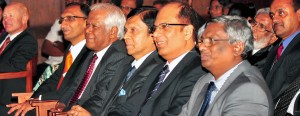Proficient accounting provides foundation for development, Cabraal says
View(s):Good accounting practices and standards create a sturdy infrastructure to support economic development, Ajith Nivard Cabraal, Governor of the Central Bank of Sri Lanka told a conference outside Colombo last week. “The quality of financial reporting will be a mirror of the real economy,” he stated.
Mr. Cabraal was the keynote speaker at the inaugural ceremony for the Conference on Financial Reporting for Economic Development held on May 19-21 at the Jetwing Blue Hotel, Negombo. Focusing on South Asia and the financial reporting supply chain, the international conference was attended by participants from around the globe. The event was hosted by the Chartered Accountants of Sri Lanka and organized by the World Bank Group, the International Federation of Accountants (IFAC), and the Confederation of Asian and Pacific Accountants (CAPA).
The conference stressed the role good financial reporting plays in boosting the business climate, improving management and governance, and creating transparency and accountability. Mr. Cabraal described accounting as “soft infrastructure” – it sets a robust foundation for businesses to grow from, just as the tangible roads, rail and ports of “hard infrastructure” do as well.
A limitation, Mr. Cabraal noted was the small number of accountants in the public sector, and lack of public sector specialised training. He emphasised the need for specialised education for public sector accountants. Often dealing with larger numbers and working within a different system, additional training would greatly improve efficiency in these areas.
During the three days of the conference, the participating regulators, academics, professionals and policy makers discussed the current international standards in accounting and the areas in need of improvement.
Increasing globalisation has created the need for much more uniform accounting standards across the world, Sujeewa Mudalige, President of CAPA explained. With IFAC at the international level, CAPA at a regional and CA Sri Lanka at national, the levelled standards organizations allow for this uniformity while still maintaining efficient administration.
Fayez Choudhury, CEO of IFAC spoke on the need of high quality financial reporting and its influence in creating a stable economy. Better accounting provides a more factual picture of the state of a company or organization, and allows for better informed decisions.
Comprehensive accounting practices play a significant role in increasing transparency and allocating responsibility. “Dubious and illegal transactions are more difficult to undertake and easier to detect,” Mr Cabraal explained. Improved standards and practices would reduce the risk of frauds and scams. It can also help in clearly defining the responsible parties when considering the failures and successes of a business, he added.
While high quality financial reporting does indeed have a strong and lasting impact on the economy and is very useful for all enterprises, Mr Cabraal warned against relying on it wholly as an indicator and as a guide. There can be limitations in using just accounting to assess the value of assets and liabilities since value is based in the larger context. He advocated for a more holistic approach, using other indicators as well.
Maintaining these independent bodies for setting and regulating accounting standards was stressed upon. Fragmenting practices in different organizations would be a hindrance to trade and give more room for illegal transactions. With uniform procedures, collaboration, growth and development all become easier. (JS)

Picture by Mangala Weerasekera shows IFAC CEO Fayez Choudhury, CB Governor Nivard Cabraal, CAPA President Sujeewa Mudalige, and CA Sri Lanka President Arjuna Herath at the inaugural sessions.


